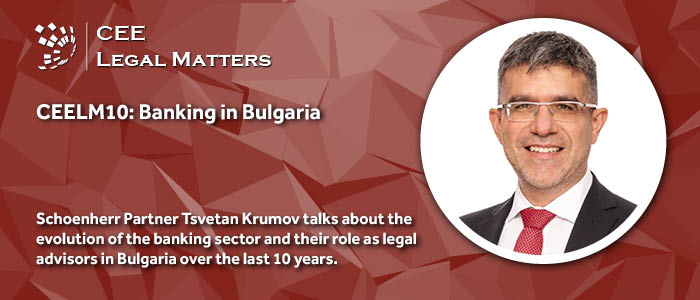Schoenherr Partner Tsvetan Krumov talks about the evolution of the banking sector and their role as legal advisors in Bulgaria over the last 10 years.
CEELM: Over the last 10 years, what types of deals and projects have kept your banking/finance team the busiest? How has that focus evolved over time?
Krumov: In Schoenherr Sofia, our focus has largely been on classic finance work, particularly representing lenders in substantial acquisition finance deals. Despite perceptions, there hasn’t been a decline in classic finance – in fact, we’ve seen a consistent influx of such projects.
The landscape has notably shifted, especially in the realm of green initiatives. Solar panel projects, once prohibitively expensive and dependent on state subsidies, are now pursued for their business viability. Our role has expanded to encompass regulatory work, especially in derivatives and financial instruments designed to manage risks like currency exchange. We’re deeply involved in these sectors, from drafting master agreements to advising on legislative developments for hedging instruments.
Bulgaria’s banking sector has maintained surprisingly low interest rates, a trend that is somewhat divergent from many Western European nations. This has had profound implications for project financing, making Bulgaria an attractive prospect for large-scale investments.
CEELM: Looking back at the last 10 years, can you pinpoint the most intense periods your team has faced in the banking and finance sector? What factors do you believe led to these particularly busy times?
Krumov: The past decade has been characterized by consistent activity with increasing deal volumes. The pandemic brought about a phase of uncertainty, yet our ongoing projects provided a buffer against the broader market downturn, to an extent. The Bulgarian economy’s resilience, primarily driven by the business sector’s adaptability, was key during this period.
A pivotal moment was the 2014 insolvency of a major Bulgarian bank. This event marked the first insolvency of its scale in our country, leading to significant litigation and transactional work. It stressed the need for stringent regulatory oversight and reshaped our approach to banking insolvency matters.
CEELM: How have the profiles of clients in the banking and finance sector evolved over the last decade?
Krumov: Our client base has been fairly stable, with a strong focus on lending institutions. We have advised significant foreign investors, particularly in the telecommunications sector. While our involvement in large acquisition finance projects remains a constant, the last few years have seen a surge in interest in Bulgarian IT businesses. This shift represents a diversification in our client portfolio, with an increasing presence of investment funds rather than traditional strategic investors.
CEELM: What about client expectations – what new demands do you see emerging in the banking and finance sector? Conversely, which aspects do you think have diminished in significance over time?
Krumov: A notable trend is the borrower-driven nature of large financings, with lenders increasingly accommodating borrowers’ requests. This shift reflects a more collaborative dynamic in financial negotiations, balancing the interests of both parties. Borrowers – especially the more sophisticated ones – are leveraging their own advisory services, while smaller entities are increasingly reliant on impartial advice from lenders’ consultants.
CEELM: From a legislative and regulatory standpoint, what recurring challenges has your team encountered in facilitating deals and projects?
Krumov: The regulatory landscape has been shaped by EU directives, requiring banks to adapt and comply with new standards. Initially, this led to a reliance on external legal advice, but over time, banks have developed robust in-house capabilities. The recent EU restructuring directive implementation in Bulgaria is a significant milestone, aimed at pre-empting insolvency for distressed businesses. Additionally, reforms in the insolvency regime have alleviated concerns for lenders, particularly regarding clawback rules and payment invalidations during suspect periods.
CEELM: Looking ahead, what do you anticipate being on the horizon for the banking and finance sector? What might be the focal points in a similar interview a decade from now?
Krumov: The future will likely see the EU and, by extension, Bulgaria, becoming more adept at handling crises. The lessons learned from recent challenges like the COVID-19 pandemic and geopolitical tensions are invaluable. As Bulgaria continues to align with larger EU economies, a positive yet realistic outlook is essential. The banking and finance sector will need to remain agile and responsive to these evolving dynamics.
Schoenherr is CEE Legal Matters' Practice Leader for Banking/Finance and Capital Markets in Bulgaria for 2024 – learn more here.
This article was originally published in Issue 10.11 of the CEE Legal Matters Magazine. If you would like to receive a hard copy of the magazine, you can subscribe here.





















